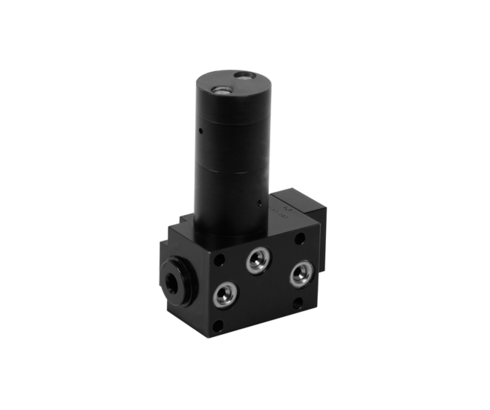Intensifier 1 – 2,6 l/min
max. operating pressure up to 500 bar
double acting, with pilot-operated check valve
Description
An oscillating pump piston, that will be automatically reversed in the end positions by a hydraulically-operated valve, is installed in the intensifier.
The ratio of the piston areas corresponds to the intensification ratio. For unhindered flow in the low-pressure range, the pump piston will be bypassed by means of a bypass-line.
A pilot-controlled check valve shuts off the high pressure.
Functional principle
The flow rate is supplied without pressure through input IN via the check valves RV3 and DV2 to the output H and thereby to the hydraulic cylinders.
At the same time, the oscillating pump OP starts working. The flow rate at output H is getting smaller and smaller and is nearly zero when reaching the maximum operating pressure.
The pump holds constant the pressure at H as long as low-pressure is available at IN. Between the ports IN and R there will be leakage of approx. 50 cm3/min, since due to functional reasons the pump elements cannot be sealed without leakage. If the input IN is depressurised, the check valve DV2 prevents a pressure drop at port H.
To retract the cylinders, port IN will be depressurised and port R pressurised. The check valves DV1 and DV2 will be unlocked and allow a free return.
Single-acting cylinders
If only single-acting cylinders are connected, a double-acting valve function is required to control the pilot-operated check valves for unclamping (see hydraulic circuit diagram).
Important notes
The intensifier can produce extremely high hydraulic pressures. The manufacturer of the system must provide effective safety valves for protection against excessive pressures.
The intensifier must always be connected for double acting use, also if only a single acting cylinder will be operated. For oil supply, port R must be depressurised, so that the pump and the pilot-operated check valves can work without failure.
As long as pressure is available at IN, the pump piston has an internal leakage by design that drains at return port R.
Accessory: Sequence valve
As soon as pressure is available at port IN the oscillating pump starts working and thereby consumes already a part of the available flowrate. Thus, the clamping time is extended.
By means of the manifold mounting sequence valve, the pump is only switched on when really required. This allows a significant reduction of the clamping time, particularly
• in systems with a relatively small low pressure pump
and / or
• if a relatively large volume is to be filled at the high-pressure side.
It is also possible to activate the high pressure only when a certain pressure is reached in the system.
| Item no. | CAD data | type | type | functioning | hydraulic port | |
|---|---|---|---|---|---|---|
|
Item no.
|
Properties
| |||||
|
Item no.
|
Properties
| |||||
|
Item no.
|
Properties
| |||||
|
Item no.
|
Properties
| |||||
|
Item no.
|
Properties
|
| Item no. | CAD data | Description |
|---|---|---|
|
Item no.
|
CAD data
|
Description
Sequence valve ND 4, for manifold mounting
check valve
adjustment range: 10 to 150 bar
max. 500 bar, as per data sheet C2.954
|
|
Item no.
|
Description
Kantseal sealing 18.77 x 1.68 mm
as per data sheet D8.757
|
|
|
Item no.
|
CAD data
|
Description
Screw M5 x 35 mm – 8.8
as per data sheet D8.757
|
Take advantage of the free benefits of our login area:
- CAD data download
- Download operating instructions
Welcome back! Log in to your already existing user account.
